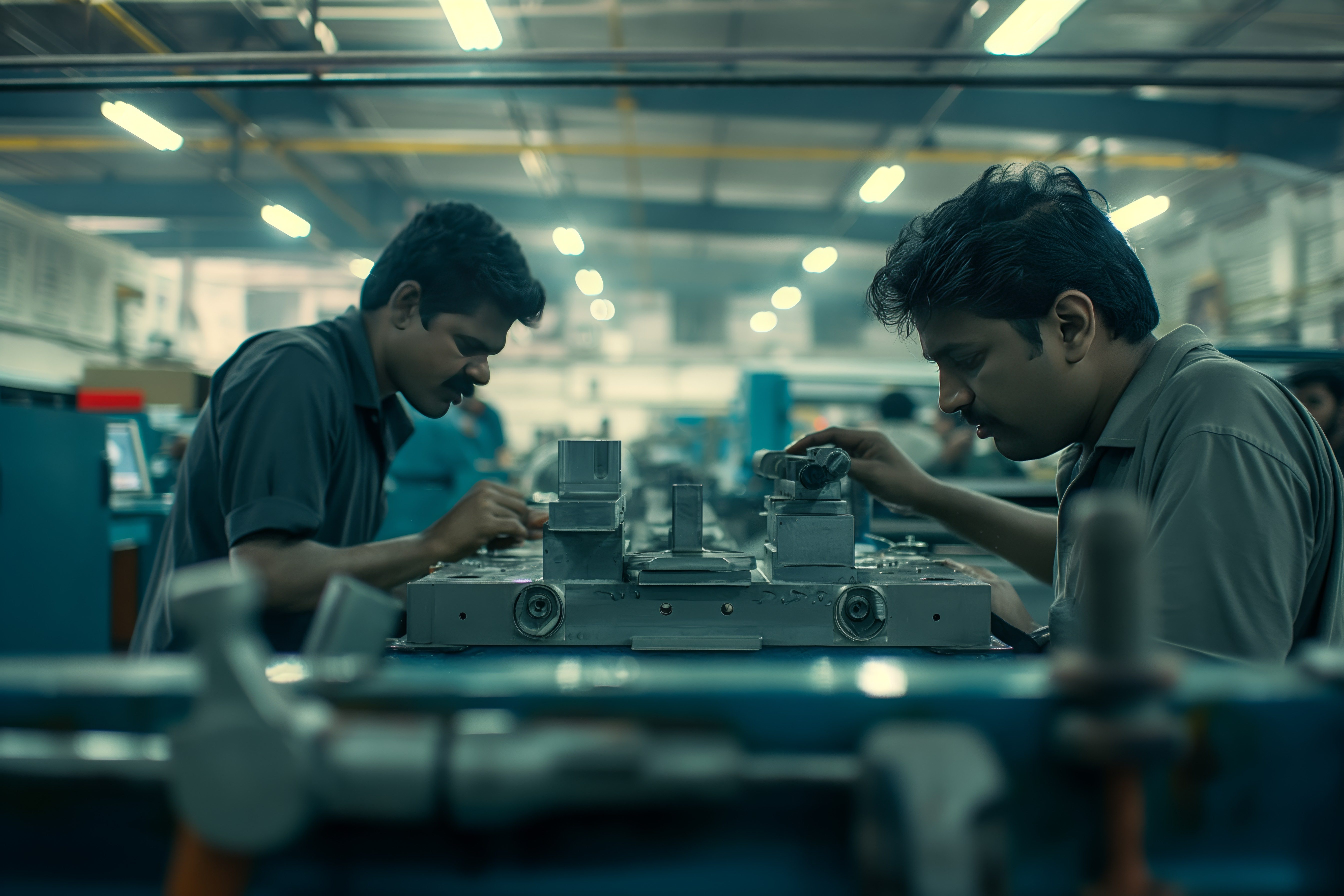
The Benefits of ERP for Manufacturing Industry
Introduction
In today’s fast-paced, competitive market, manufacturers must continuously improve their operations to stay ahead. Discrete manufacturing, characterized by the production of distinct items such as automobiles, machinery, and electronics, presents unique challenges that require effective management of resources, processes, and data. Enterprise Resource Planning (ERP) systems have become essential tools for manufacturers, providing comprehensive solutions to streamline operations, enhance efficiency, and drive growth. This blog will explore the numerous benefits of ERP for the manufacturing industry, with a particular focus on discrete manufacturing.
Understanding Discrete Manufacturing
Before delving into the benefits of ERP, it’s essential to understand the concept of discrete manufacturing. Unlike process manufacturing, where products are produced in bulk and are indistinguishable from one another (such as chemicals or food), discrete manufacturing involves the production of individual items or units that can be easily counted, touched, and seen. Examples include automobiles, aircraft, computers, and household appliances.
Discrete manufacturing typically involves a complex process of assembling parts and components into a final product. This process requires meticulous planning, precise inventory management, and efficient use of resources. Given these challenges, manufacturers need a robust system to manage their operations effectively, which is where ERP comes in.
Challenges in Discrete Manufacturing
Discrete manufacturing comes with its own set of challenges, including:
- Complex Production Processes: Managing the production of individual units, each with its own set of parts and components, can be intricate and requires detailed planning.
- Inventory Management: Maintaining the right inventory levels is critical. Overstocking leads to increased carrying costs, while understocking can cause production delays.
- Quality Control: Ensuring that each unit meets the required quality standards is vital for maintaining customer satisfaction and brand reputation.
- Supply Chain Management: Coordinating with multiple suppliers, managing lead times, and ensuring timely delivery of parts is a significant challenge in discrete manufacturing.
- Regulatory Compliance: Manufacturers must adhere to various industry regulations, including safety standards, environmental regulations, and labor laws.
- Cost Management: Controlling production costs while maintaining profitability is a constant concern for manufacturers.
- Data Management: Managing vast amounts of data related to production, inventory, sales, and finance requires an integrated system to avoid silos and ensure accurate decision-making.
How ERP Benefits the Manufacturing Industry
ERP systems address these challenges by integrating various business processes into a single, cohesive system. Here’s how ERP benefits the manufacturing industry, particularly discrete manufacturing:
1. Streamlined Production Planning
ERP systems provide manufacturers with advanced tools for production planning. These tools help in creating detailed production schedules, managing work orders, and ensuring that the necessary resources are available at the right time. With an ERP system, manufacturers can optimize their production processes, reduce downtime, and increase overall efficiency.
Key Benefits:
- Improved production scheduling
- Reduced lead times
- Enhanced resource utilization
- Minimized production bottlenecks
2. Efficient Inventory Management
Inventory management is a critical aspect of discrete manufacturing. An ERP system provides real-time visibility into inventory levels, helping manufacturers maintain optimal stock levels. This reduces the risk of stockouts, minimizes carrying costs, and ensures that production runs smoothly.
Key Benefits:
- Real-time inventory tracking
- Reduced carrying costs
- Improved order accuracy
- Better inventory turnover
3. Enhanced Quality Control
Quality control is crucial in discrete manufacturing, where each unit must meet specific standards. ERP systems help manufacturers maintain high-quality standards by integrating quality control processes into the production workflow. This ensures that quality checks are performed at every stage of production, reducing the risk of defects and ensuring customer satisfaction.
Key Benefits:
- Consistent quality control processes
- Reduced defects and rework
- Improved customer satisfaction
- Compliance with industry standards
4. Better Supply Chain Management
ERP systems enhance supply chain management by providing real-time visibility into the entire supply chain. This allows manufacturers to track the movement of goods, manage supplier relationships, and ensure timely delivery of parts and components. With an ERP system, manufacturers can reduce lead times, lower costs, and improve overall supply chain efficiency.
Key Benefits:
- Real-time supply chain visibility
- Improved supplier management
- Reduced lead times
- Lower supply chain costs
5. Accurate Demand Forecasting
Demand forecasting is essential for manufacturers to ensure that they produce the right quantity of products to meet customer demand. ERP systems use historical data, market trends, and advanced analytics to provide accurate demand forecasts. This helps manufacturers plan their production schedules, manage inventory levels, and avoid overproduction or underproduction.
Key Benefits:
- Accurate demand forecasting
- Optimized production schedules
- Reduced risk of overproduction or stockouts
- Improved customer satisfaction
6. Regulatory Compliance
Manufacturers must adhere to various industry regulations, including safety standards, environmental regulations, and labor laws. ERP systems help manufacturers stay compliant by automating compliance processes, generating necessary reports, and providing audit trails. This reduces the risk of non-compliance and associated penalties.
Key Benefits:
- Automated compliance processes
- Reduced risk of non-compliance
- Streamlined reporting and documentation
- Improved regulatory adherence
7. Cost Control and Financial Management
Cost control is a significant concern for manufacturers. ERP systems provide detailed insights into production costs, including labor, materials, and overheads. This allows manufacturers to identify cost-saving opportunities, optimize resource allocation, and improve profitability. Additionally, ERP systems integrate financial management processes, providing a unified view of the company’s financial health.
Key Benefits:
- Detailed cost analysis
- Improved profitability
- Better resource allocation
- Unified financial management
8. Improved Data Management and Decision-Making
Manufacturers generate vast amounts of data daily, including production data, inventory levels, sales figures, and financial information. ERP systems centralize this data, providing a single source of truth for decision-making. With real-time access to accurate data, manufacturers can make informed decisions, identify trends, and respond quickly to market changes.
Key Benefits:
- Centralized data management
- Real-time data access
- Improved decision-making
- Enhanced business agility
9. Scalability and Flexibility
As manufacturers grow, their processes become more complex, and their need for efficient management systems increases. ERP systems are scalable and flexible, allowing manufacturers to add new modules and functionalities as their business evolves. This ensures that the ERP system continues to meet the company’s needs, regardless of its size or complexity.
Key Benefits:
- Scalable to accommodate business growth
- Flexible to adapt to changing needs
- Long-term investment in business efficiency
- Future-proofing manufacturing operations
10. Enhanced Collaboration and Communication
Collaboration between departments is crucial for the success of any manufacturing operation. ERP systems facilitate communication and collaboration by providing a unified platform where all departments can share information and work together. This improves coordination, reduces delays, and ensures that everyone is on the same page.
Key Benefits:
- Improved cross-departmental collaboration
- Reduced communication silos
- Enhanced coordination and efficiency
- Faster decision-making
Key Considerations for Implementing ERP in Manufacturing
While ERP systems offer numerous benefits, successful implementation requires careful planning and consideration. Here are some key factors to consider:
1. Assessing Business Needs
Before selecting an ERP system, manufacturers should conduct a thorough assessment of their current processes, identify pain points, and determine the specific features and functionalities required to address these challenges.
2. Choosing the Right ERP Solution
Not all ERP systems are created equal. Manufacturers should choose an ERP solution that offers robust manufacturing modules, integrates with other business functions, and can scale with the company’s growth. For instance, ACCNU ERP offers comprehensive manufacturing modules tailored to meet the needs of discrete manufacturers.
3. Planning the Implementation
A successful ERP implementation requires detailed planning. This includes setting clear objectives, assembling a project team, and developing an implementation plan that outlines timelines, responsibilities, and key milestones.
4. Training and Change Management
Employees must be trained to use the new ERP system effectively. This involves conducting training sessions, providing user manuals, and offering ongoing support. Additionally, change management strategies should be implemented to ensure a smooth transition to the new system.
5. Data Migration
Migrating data from legacy systems to the new ERP system is a critical step. Manufacturers must ensure that data is accurately transferred and that any inconsistencies are addressed before going live.
6. Testing and Go-Live
Before going live, manufacturers should conduct thorough testing to ensure that the ERP system functions as expected. This includes testing various scenarios, identifying and resolving any issues, and ensuring that all business processes are integrated seamlessly.
7. Continuous Improvement
ERP implementation is not a one-time event. Manufacturers should continuously monitor the system’s performance, gather feedback from users, and make necessary adjustments to optimize its functionality.
Conclusion
The manufacturing industry, especially discrete manufacturing, faces numerous challenges that require effective management solutions. ERP systems have proven to be invaluable tools for manufacturers, offering a wide range of benefits that enhance efficiency, reduce costs, and improve decision-making. By integrating various business processes into a single system, ERP enables manufacturers to streamline their operations, maintain high-quality standards, and stay competitive in a rapidly changing market.
For manufacturers looking to future-proof their operations, investing in a robust ERP system like ACCNU ERP can provide the necessary tools to achieve sustainable growth and success. Contact us to learn more about how ACCNU ERP can transform your manufacturing business.


